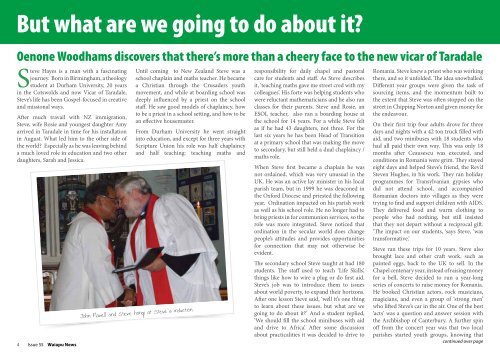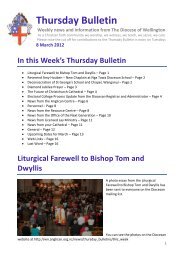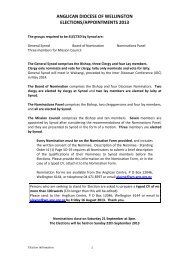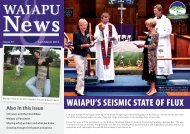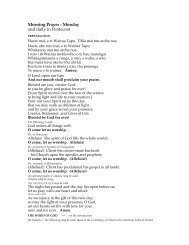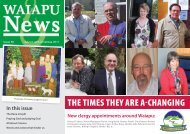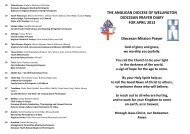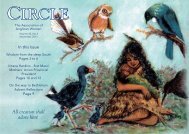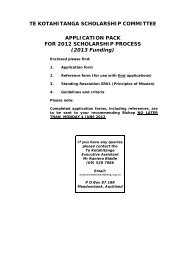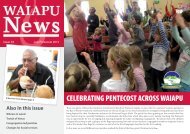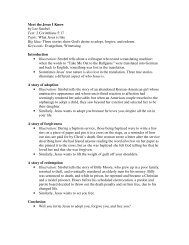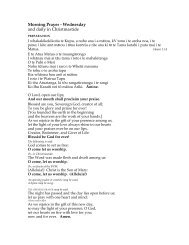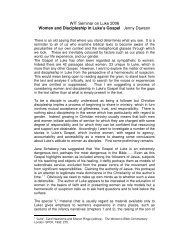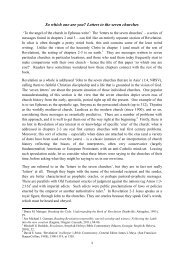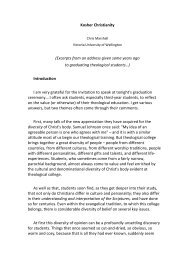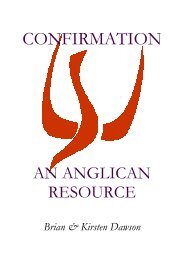ANGLICANS IN AOTEAROA - Waiapu Anglican Social Services
ANGLICANS IN AOTEAROA - Waiapu Anglican Social Services
ANGLICANS IN AOTEAROA - Waiapu Anglican Social Services
Create successful ePaper yourself
Turn your PDF publications into a flip-book with our unique Google optimized e-Paper software.
But what are we going to do about it?<br />
Oenone Woodhams discovers that there’s more than a cheery face to the new vicar of Taradale<br />
Steve Hayes is a man with a fascinating<br />
journey. Born in Birmingham, a theology<br />
student at Durham University, 20 years<br />
in the Cotswolds and now Vicar of Taradale,<br />
Steve’s life has been Gospel-focused in creative<br />
and missional ways.<br />
After much travail with NZ immigration,<br />
Steve, wife Rosie and youngest daughter Amy<br />
arrived in Taradale in time for his installation<br />
in August. What led him to the other side of<br />
the world? Especially as he was leaving behind<br />
a much loved role in education and two other<br />
daughters, Sarah and Jessica.<br />
4 Issue 55 <strong>Waiapu</strong> News<br />
Until coming to New Zealand Steve was a<br />
school chaplain and maths teacher. He became<br />
a Christian through the Crusaders youth<br />
movement, and while at boarding school was<br />
deeply influenced by a priest on the school<br />
staff. He saw good models of chaplaincy, how<br />
to be a priest in a school setting, and how to be<br />
an effective housemaster.<br />
From Durham University he went straight<br />
into education, and except for three years with<br />
Scripture Union his role was half chaplaincy<br />
and half teaching: teaching maths and<br />
John Flavell and Steve hongi at Steve’s induction.<br />
responsibility for daily chapel and pastoral<br />
care for students and staff. As Steve describes<br />
it, ‘teaching maths gave me street cred with my<br />
colleagues’. His forte was helping students who<br />
were reluctant mathematicians and he also ran<br />
classes for their parents. Steve and Rosie, an<br />
ESOL teacher, also ran a boarding house at<br />
the school for 14 years. For a while Steve felt<br />
as if he had 43 daughters, not three. For the<br />
last six years he has been Head of Transition<br />
at a primary school that was making the move<br />
to secondary, but still held a dual chaplaincy /<br />
maths role.<br />
When Steve first became a chaplain he was<br />
not ordained, which was very unusual in the<br />
UK. He was an active lay minister in his local<br />
parish team, but in 1999 he was deaconed in<br />
the Oxford Diocese and priested the following<br />
year. Ordination impacted on his parish work<br />
as well as his school role. He no longer had to<br />
bring priests in for communion services, so the<br />
role was more integrated. Steve noticed that<br />
ordination in the secular world does change<br />
people’s attitudes and provides opportunities<br />
for connection that may not otherwise be<br />
evident.<br />
The secondary school Steve taught at had 180<br />
students. The staff used to teach ‘Life Skills’,<br />
things like how to wire a plug or do first aid.<br />
Steve’s job was to introduce them to issues<br />
about world poverty, to expand their horizons.<br />
After one lesson Steve said, ‘well it’s one thing<br />
to learn about these issues, but what are we<br />
going to do about it?’ And a student replied,<br />
‘We should fill the school minibuses with aid<br />
and drive to Africa’. After some discussion<br />
about practicalities it was decided to drive to<br />
Romania. Steve knew a priest who was working<br />
there, and so it unfolded. The idea snowballed.<br />
Different year groups were given the task of<br />
sourcing items, and the momentum built to<br />
the extent that Steve was often stopped on the<br />
street in Chipping Norton and given money for<br />
the endeavour.<br />
On their first trip four adults drove for three<br />
days and nights with a 42 ton truck filled with<br />
aid, and two minibuses with 18 students who<br />
had all paid their own way. This was only 18<br />
months after Ceausescu was executed, and<br />
conditions in Romania were grim. They stayed<br />
eight days and helped Steve’s friend, the Rev’d<br />
Steven Hughes, in his work. They ran holiday<br />
programmes for Transylvanian gypsies who<br />
did not attend school, and accompanied<br />
Romanian doctors into villages as they were<br />
trying to find and support children with AIDS.<br />
They delivered food and warm clothing to<br />
people who had nothing, but still insisted<br />
that they not depart without a reciprocal gift.<br />
‘The impact on our students, ‘says Steve, ‘was<br />
transformative.’<br />
Steve ran these trips for 10 years. Steve also<br />
brought lace and other craft work, such as<br />
painted eggs, back to the UK to sell. In the<br />
Chapel centenary year, instead of raising money<br />
for a bell, Steve decided to run a year-long<br />
series of concerts to raise money for Romania.<br />
He booked Christian actors, rock musicians,<br />
magicians, and even a group of ‘strong men’<br />
who lifted Steve’s car in the air. One of the best<br />
‘acts’ was a question and answer session with<br />
the Archbishop of Canterbury. A further spin<br />
off from the concert year was that two local<br />
parishes started youth groups, knowing that<br />
continued over page


